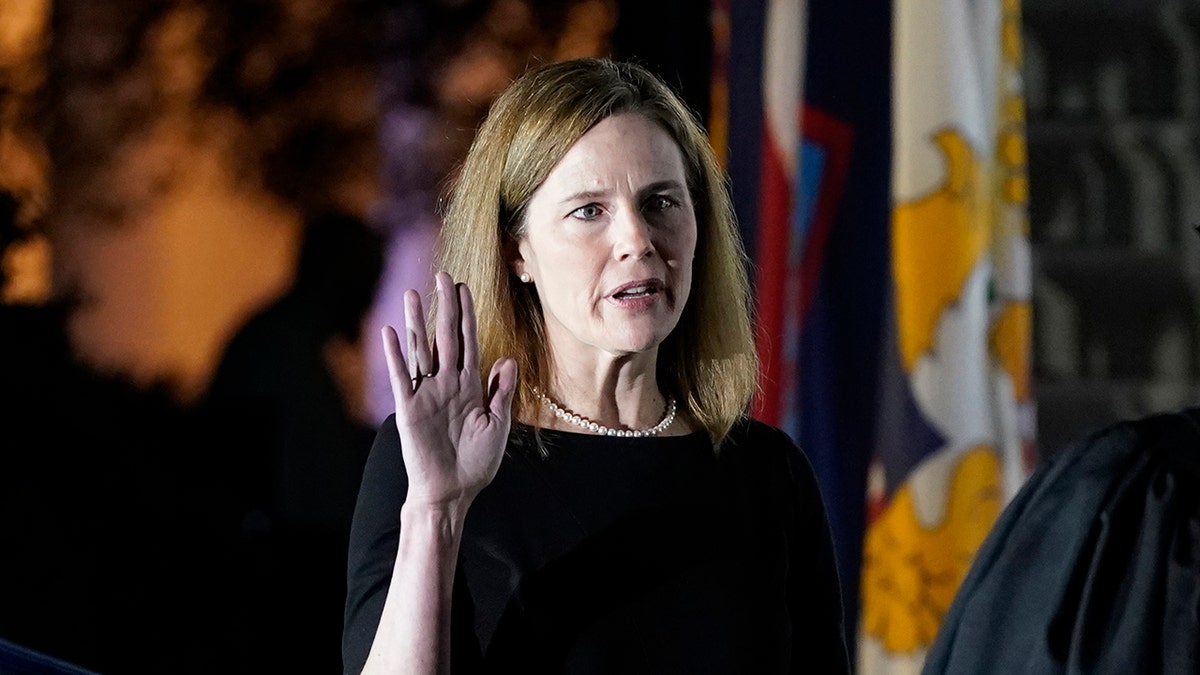Sen. Hawley blasts Dems for criticizing Barrett's faith
Criticism of Amy Coney Barrett's faith is 'attempt to bring back an old standard that the Constitution of the United States explicitly forbids,' Sen. Josh Hawley, R-Mo., said during his opening statements.
This week I proudly voted to confirm Amy Coney Barrett to the Supreme Court of the United States. For President Trump, it was his third Supreme Court appointment in fewer than four years. But this nomination was especially significant. It represents a sea change in the way Republicans choose and confirm Supreme Court justices.
For the first time in decades, religious conservatives had a strong voice in the process. And the result was the most openly pro-life, pro-faith nominee of my lifetime.
Amy Coney Barrett has left no doubt about her faith convictions. She is a devout Catholic and charismatic who has lived her faith in every walk of her life — choosing to teach at a Catholic university, publicly defending her church, mentoring Christian law students, and speaking to Christian legal groups.
And she has left no doubt about her convictions on life. Before she joined the 7th U.S. Circuit Court of Appeals, Barrett openly condemned “abortion on demand.” She endorsed the “right to life” for every child, advocated for the unborn to be protected in law, and raised doubts in her academic writing and speaking about Roe v. Wade, the 1973 Supreme Court decision that barred states and the federal government from outlawing abortion .
More from Opinion
In the past, judicial candidates like this didn’t get nominated to the nation’s highest court. The lesson the Republican establishment learned from the failed confirmation of Robert Bork in the late 1980s and the attempted destruction of now-Justice Clarence Thomas a few years later was this: the less said by Republican judicial nominees, the better. The shorter the public paper trail, the better. And the virtue of silence was especially encouraged when it came to the hot-button issue of life.
That didn’t stop Republican politicians from campaigning on the Supreme Court, of course. It didn’t stop them from telling voters, for decades, that they would support pro-life judges and nominees faithful to the Constitution.
But back in Washington, the Republican establishment sang a different tune. Trust us, they said. Let us do the vetting. Don’t ask too many questions. And when religious conservatives dared to raise concerns, they were told not to talk too much about Roe or life lest they jeopardize “the process.”
Voters were left to watch as one Republican-nominated justice after another failed to be the pro-life, pro-Constitution originalists the politicians had promised.
That’s one reason I went to the Senate floor this past summer to vow that I would only support Supreme Court nominees whose record confirmed that they understood Roe was an act of judicial imperialism and that it was wrongly decided.
No more private assurances, no more backroom winks and nods. I wanted evidence on the record that demonstrated the nominee, whoever it was, understood the clear difference between judging and legislating from the bench.

President Donald Trump watches as Supreme Court Justice Clarence Thomas administers the Constitutional Oath to Amy Coney Barrett on the South Lawn of the White House in Washington, Monday, after Barrett was confirmed by the Senate earlier in the evening. (AP Photo/Patrick Semansky)
Amy Coney Barrett more than met that standard. And that’s why President Trump’s decision to nominate her, after listening carefully to religious conservatives, was so significant.
CLICK HERE TO SIGN UP FOR OUR OPINION NEWSLETTER
News reports indicate the usual Republican suspects had until recently regarded Barrett as “too conservative” because of her plainly stated views, and too likely to stall in the confirmation process. But President Trump rejected the conventional wisdom and nominated her anyway.
In her nomination hearing, Barrett broke the pattern again: she refused to back away from her stated convictions on life or faith. She repeatedly explained to senators that she wouldn’t pledge her vote on any case, but she would not apologize for her convictions or past statements and writings. And in the end, she won confirmation in the Senate with the support of all but one Republican.
All that adds up to this: the days of nominees hiding their faith and downplaying their religious convictions as too “controversial” should be over. Our Constitution imposes no “religious test” for office; in fact, it excludes such tests. People of faith are welcome in public life and on the high court.
CLICK HERE TO GET THE FOX NEWS APP
And the days of nominees refusing to talk about life should be over too. Nominees cannot commit their votes in future cases, but they should be free to state their pro-life views, as Amy Coney Barrett did, and defend them.
Justice Barrett’s record on the Supreme Court will take years to develop and even longer to assess. But for religious conservatives, her confirmation is already a landmark.










































